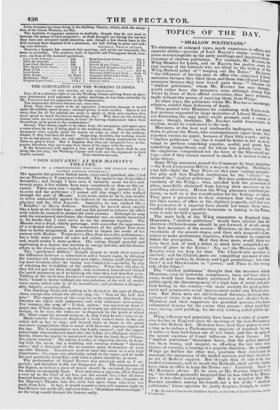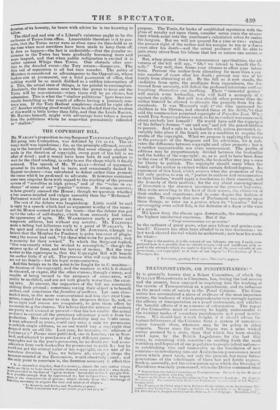TOPICS OF THE DAY,
" SHALLOW POLITICIANS." patieHntecgkenoaci..:
To statesmen of enlarged views, much experience in affairs, d superior ability—persons of Lord BACON'S stamp—nothin anD- pears so contemptible as the petty cavillings and im mousness of shallow politicians. For example, Mr. BAINES, Whig Member fur Leeds, and its BACON, has perfect scorn for that section of the Liberals who are blind to the wisdom of the Whig-Radical policy of " keeping out the Tories." " the difference of having men in office who supported Liberal's' measures because they liked them, and those who adopted Liberal measures because they were forced upon them : "* whereas the "shallow politicians," whom Mr. BAINES has seen through, would rather have the measures, even although wrunogfarelm: Tories by force of their official necessities, than mere proposals, made without the means of carrying them, from Whigs. In other ways, the politicians whom Mr. BAINES so bee 'inig rebukes, exhibit their deficiency of depth. They quarrel with Ministers for combining with Tories to de- feat motions supported by large majorities of Liberal Members,- not discerning the sage policy which prompts such a course of action ; though, doubtless, Mr. BAINES could demonstrate its wisdom, would he condescend to the task.
Measures, at the best and confessedly inadequate, are pared down to please the Peers, who contemptuously reject them; their rejection excites no anger, because of their little worth : and the " shallow politicians " say that it would be better to fail in an at- tempt to perform something popular, useful, and great, than something insignificant, and for whose loss nobody cares. But the simpletons comprehend not the force of the Ministerial apo- logy—that if they cannot succeed in small, it is useless to aim at large things.
Some Whig measures passed the Commons by large majorities —the Irish Corporation Bill by a majority of eighty. Hold fast to your bill—fight the Tory Peers on this your 'vantage-ground- fair play and free English institutions for the "aliens!" es- claimed the " shallow politicians." But they underrated the nag. nanimity of the Whigs ; who, satisfied with the possession of place, mercifully abstained from forcing their measures on the unwilling adversary. Herein the Whig placemen exhibited pru- dence, as well as a due consideration for the feelings of others. They gave a guarantee to their retainers that they would not put their tenure of office in the slightest jeopardy, and that even the possession of a superior force should not tempt them into a conflict which could possibly terminate in letting in the Tories, were it only for half a quarter.
The main bulk of the Whig supporters in England being Dissenters, "shallow politicians" would have advised that the abolition of Church-rates should be put forward, if at all, among the first measures of the session : Ministers, on the contrary, let two-thirds of the session elapse, and then only proposed a Com- mittee to make preliminary inquiries, which cannot be completed before the prorogation. Had they done more, would there not have been risk of such a defeat as must have compelled a sus- render of place to the Tories ? No, no! the Ministers and Mr. BAINES were too deep for that. The Church-rate question is shelved ; and the Church party are compelling payment of rates from all and sundry, by distress and legal proceedings : but what then ? is not MELBOURNE in " power," and PEEL on the wrong side of the Chair ?
The " shallow politicians" thought that the measures which Ministers, even by unworthy compliances, have not been able to carry, would have been dearly purchased by the debasement of public-spirit, the discouragement of a high tone of moral and poli- tical feeling in the country—the main security fur good govern- ment and progressive social improvement under any Administra- tion. But these men are old-fashioned theorists, deriving their notions of virtue from their college exercises and obsolete Larks. Ministers and their supporters are practical persons, who have substantial reasons for the course they pursue : what need they care, having solid pudding, for the airy nothing called public opi- nion ?
Whig influence and popularity have been in a state of progres- sive decline in England since the meeting of the first Parliament under the Reform Act. Ministers have used their power in such a way as to reduce a Parliamentary majority of hundreds to. one of units—a bare half-dozen out of 658 votes; and this in spite the recent exertion of Court influence in their favour. The " shallow politicians " thereupon fancy, that the policy pursued . has been wrong, and suggest, as affording the last and only chance of recovery, a leaning in a popular direction : the profound Whigs go further the other way, proclaim their resolution to maintain the supremacy of the landed interest, and their desire to be rid of Radical support. But though they do side with the landed aristocracy, and do insult the Radicals, shall not the, latter keep them in office to keep the Tories out ? Certainly. Such rs Mr. BAINES'S advice. To be sure, as Mr. BAINES himself tells us, " his friends generally imagined that he was ridden by Minis- ters : it was their honest opinion." But it is manifest that Mr. BAINES numbers among his friends not a few of the shallow. politicians," whose opinions he justly despises, though, in curio- • Mr. BAINKS'S Church.rate Abolition Speech, at the City of Loudon Tavern, en the tith instant. deration of its honesty, he bears with advice he is too knowing to
follow. The chief end and aim of a Liberal's existence ought to be the
exclusion of Tories from office. Lamentable therefore is it to per- ceive, that the Tories never were so close upon its threshold as at the time when most sacrifices have been made to keep them off. It does so happen—the fact is undeniable—that the popular re- sistance to the Tories has been gradually becoming more and more languid, and that when public indignation is excited it is rather against Whigs than Tories. One obstacle after ano- ther to the dreaded event—the Tory return—disappears. The thin veil of separation is all but torn asunder. Tho policy of Ministers is considered so advantageous to the Opposition, whose leaders aim at permanent, not a brief peesession of office, that nothing would be so much disliked as a sudden interruption of it. This, the actual state of things, is too painful to contemplate. Absolutely, the time seems near when the power to keep out the Tories will be non-existent--when there will be no choice, but submission. This is what the "shallow politicians" have been con- stantly foretelling as the result of efforts having a precisely con- trary aim. If the Tory-Radical simpletons should be right after all! Another striking proof would then be afforded that the wisdom of this world is little better than folly, and that the Leeds BACON, Mr. BAINES himself, might with advantage have taken a lesson from the politicians whom he somewhat prematurely ridiculed as " shallow."



























 Previous page
Previous page